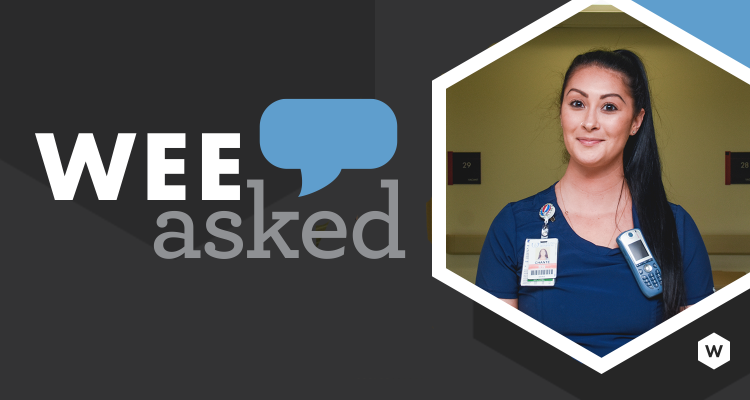Editor’s note: We owe our nurses everywhere a big thank you and more appreciation than ever for helping us through this pandemic. Look for Weelunk’s Q&A stories with several Ohio Valley nurses in the coming days in honor of National Nurses Week, May 6-12.
Q. Could you please explain your job — what it is you do daily?
Chante Gonzales, ER nurse: If someone were to search what our job description is it would look very similar to this:
“Provides nursing care to assigned patients by utilizing basic scientific principles of nursing congruent with the Nurse Practice Act standards of nursing practice and in accordance with policies/procedures of Wheeling Hospital. Working towards or competent in performing clinical skills required for chosen clinical level.”
Although this is a broad spectrum of what our company expects from us as nurses, what this description doesn’t include is our perspective of what we do day in and day out, specifically in the emergency department. Like so many other jobs, our job actually starts way before physically swiping in. Most of us wake up and prepare for the day with caffeine! After putting on our scrubs pulling our hair back, taking a deep breath and clipping that badge on, we have to mentally and emotionally prepare for the day. Some people like to pray, some listen to music and jam out in their car before going inside. Whatever the case may be, we all in some way or form remind ourselves to “accept the things we cannot change today, and the courage to change the things we can.”
Once we arrive in our department, we all receive our assigned zone including the four rooms we will be in charge of for the shift. We proceed to the zone where we then receive bedside report from the nurse who worked the prior shift. We then ensure that the patients we will be taking care over are comfortable, have been given all the ordered medications, updated vital signs, comfort and safety measures provided, and are prepared for their tests/screenings. As nurses, we are always double-checking the safety of the room — not just for the patients but for ourselves as well. We never leave a room without ensuring the bed in locked and in lowest position, and the call bell is within reach.
In the emergency department, it is very difficult to sum up what we do daily, simply because we are faced with so many different cases within a 12-hour shift. We may see patients who have stubbed their toe, experiencing generalized abdominal pain, worsening chest pain, to cardiac arrests, respiratory distresses and even level 1, 2 and 3 traumas. Throughout our shift, we help our fellow nurses with the more extensive patient needs/care, as well as helping each other regularly so we can take our greatly needed bathroom breaks and snack breaks. Nevertheless, we are constantly moving, ensuring our patients’ needs are always met before our own and providing the best care possible. During our shifts, we may have an expecting mother in active labor, and we may also have a patient pass away right in front of our eyes. The ups and downs of the job are very real, but we have such a wonderful group of nurses in our emergency department that you never feel alone. Seasoned nurses are constantly helping the newer nurses, and you never have to perform a task alone if you don’t feel you are ready to do so yet.
Our day-to-day life in the emergency department is always changing, but that’s also the beauty of it, too. We are constantly using the most basic to the more difficult skills we learned since day one in nursing school but, above all, our critical thinking skills.
Swiping out at the end of our shift is something most of us nurses really look forward to, with that being said, knowing we are coming back to a new day/night with a fresh start and all new cases and knowing we can make a difference in peoples’ lives is also something most nurses, including myself truly look forward to.
Q. How has life in the hospital changed since COVID-19? How has your life changed?
Chante: A lot of people in the emergency department would say, it’s been “business as usual.” Although, in many aspects, this may be true, however as nurses we have a lot more responsibility placed on our shoulders. Whether or not we are a new grad, a seasoned nurse, young, older, with or without children, we are all faced with the same concerns and unknowns of what is to come. Not knowing what we could potentially come in contact with at work is always going to be scary, but possibly bringing the virus home to one of our loved ones or family members in beyond scary. Taking every precaution from stripping out of our scrubs in the front lawn to scrubbing our hands raw, we as nurses are very resilient.
Wearing a surgical mask/N95 mask for 12 hours our skin begins to break out, break down, and we are finding it more difficult to perform our duties without the feeling of being suffocated. We find after wearing our PPE gear for long periods of time we are becoming overheated, dizzy, dehydrated and going home with migraines. We are not only mentally and emotionally exhausted, we are physically exhausted. With that being said, when we are off-duty, it can feel very isolating. Some people believe that we are bringing COVID virus out into the public. We are avoided at all costs in the grocery stores, gas stations and even in our own neighborhoods. This brings upon more feelings of isolation, more than others during an already “isolated time.”
Q. What made you want to be a nurse?
Chante: When I was growing up, I never even really understood what it meant to be a nurse. Like most high school kids, I thought I had it all figured out, and I originally applied to an art school. However, my mother made me volunteer at a nursing home, along with my siblings. After spending all my free time painting nails, playing rummy and reading stories to the elderly population, I fell in love and began perusing a career as a nurse. I initially started out as a CNA before switching gears to become a rehabilitation tech followed by working as an administrative assistant for a physical therapy company. I started to see myself going further away from patient care, so I followed my heart and went on to become an LPN followed by my RN. I now work as registered nurse in the emergency department at Wheeling Hospital.
There is nothing, and I mean nothing, more rewarding in life than knowing that I am helping people every day. Whether I simply made a person smile, I took their pain away, I helped them in need or just being a listening ear to someone. I know this is something I want to do for the rest of my life. I could not see myself doing anything else.
One of my favorite quotes is, “Too often we underestimate the power of a touch, a smile, a kind word, a listening ear, an honest compliment or the smallest act of caring, all of which have the potential to turn a life around” by Leo Buscaglia. This quote truly brings home what I believe nurses do every day.
Q. Given the current COVID-19 pandemic, how has this situation reaffirmed your commitment to serving patients?
Chante: Whether we are in a pandemic or life is going on as normal, I and so many other nurses treat every patient with the utmost care. Every single patient receives the same amount of respect, care and devotion as the next. Even with thoughts of contracting COVID-19 and spreading it to loved ones is always in the back of my mind, being a nurse is not just something I do, it’s who I am. We care for people, and want to help, and we will not let this pandemic question our decision of why we became a nurse to begin with.
Q. How important has teamwork been throughout this crisis? Would you share an example of how teamwork among your fellow nurses/care team has helped lead to a successful outcome.
Chante: The emergency department is above all the best place I’ve ever witnessed true teamwork. Pandemic or not, we are a very strong team, and I believe we will remain that way. Teamwork on any day is extremely important, but more so during a pandemic such as this. We need all the support and help we can get! Without the members of my team, I would not be the nurse I am today and am very grateful for their support.
Lisa Starkey, Reynolds Memorial Hospital
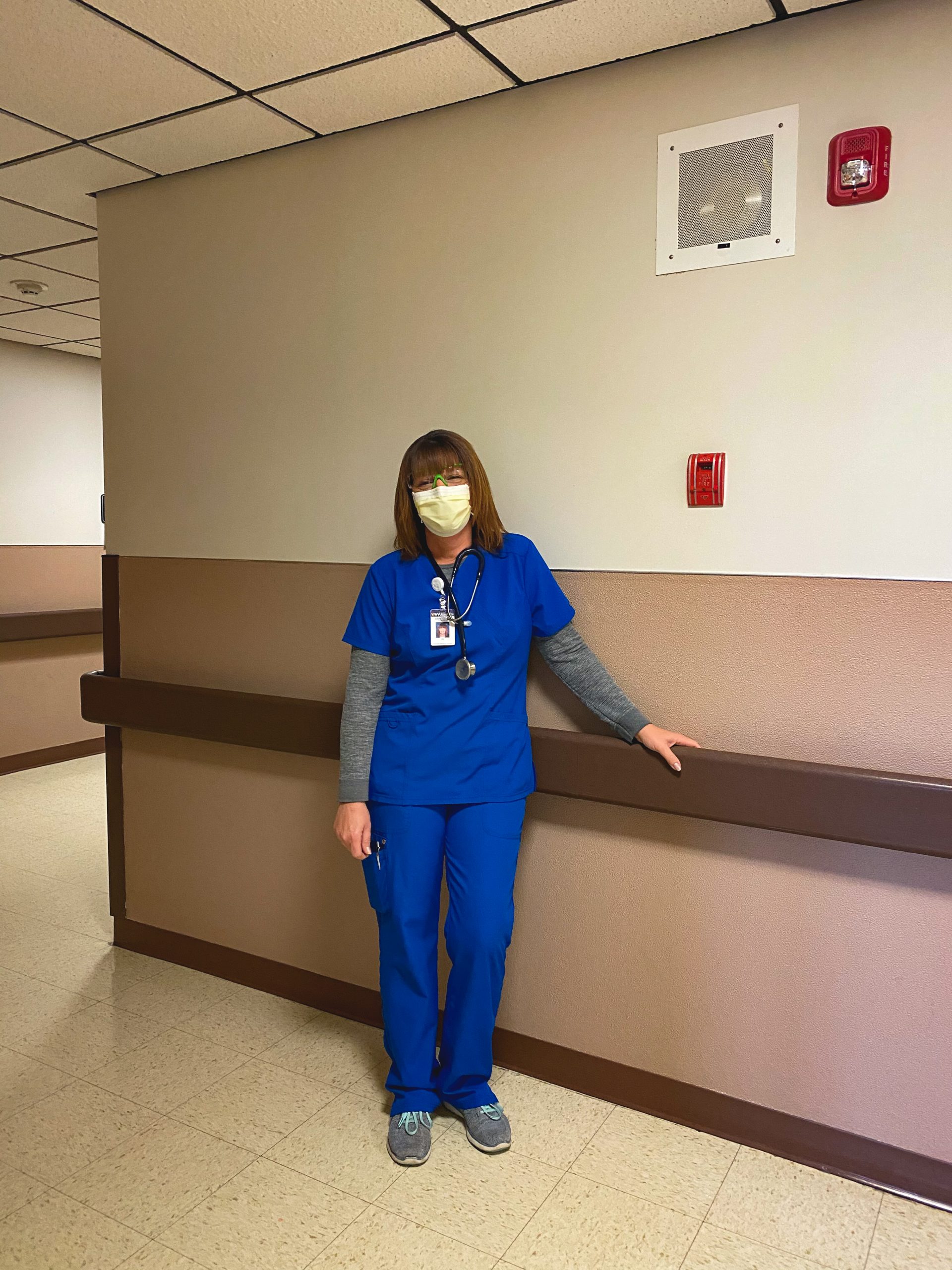 Q. Could you please explain your job — what it is you do daily?
Q. Could you please explain your job — what it is you do daily?
Lisa Starkey, RN: I am a registered nurse; I provide care to patients.
Q. How has life in the hospital changed since COVID-19? How has your life changed?
Lisa: Increased being cautious with additional PPE. My life has changed by using PPE in public; increased concern for your children.
Q. What efforts are being taken to protect the nurses on shift?
Lisa: Additional sanitizing, additional PPE.
Q. Did you ever think you’d see a pandemic like this in your lifetime?
Lisa: I feel like COVID-19 is the same as other things that we have seen in the past … SARS/H1N1 etc.
Q. Because it is Nurse Appreciation Week, what would you like to say about your team and fellow coworkers?
Lisa: My team/fellow coworkers pull together in time of need.
Q. If there was one thing you could tell the public or ask the public to do to stay safe, what would it be?
Lisa: Follow CDC guidelines.
Brittany DeCrease, Reynolds Memorial Hospital
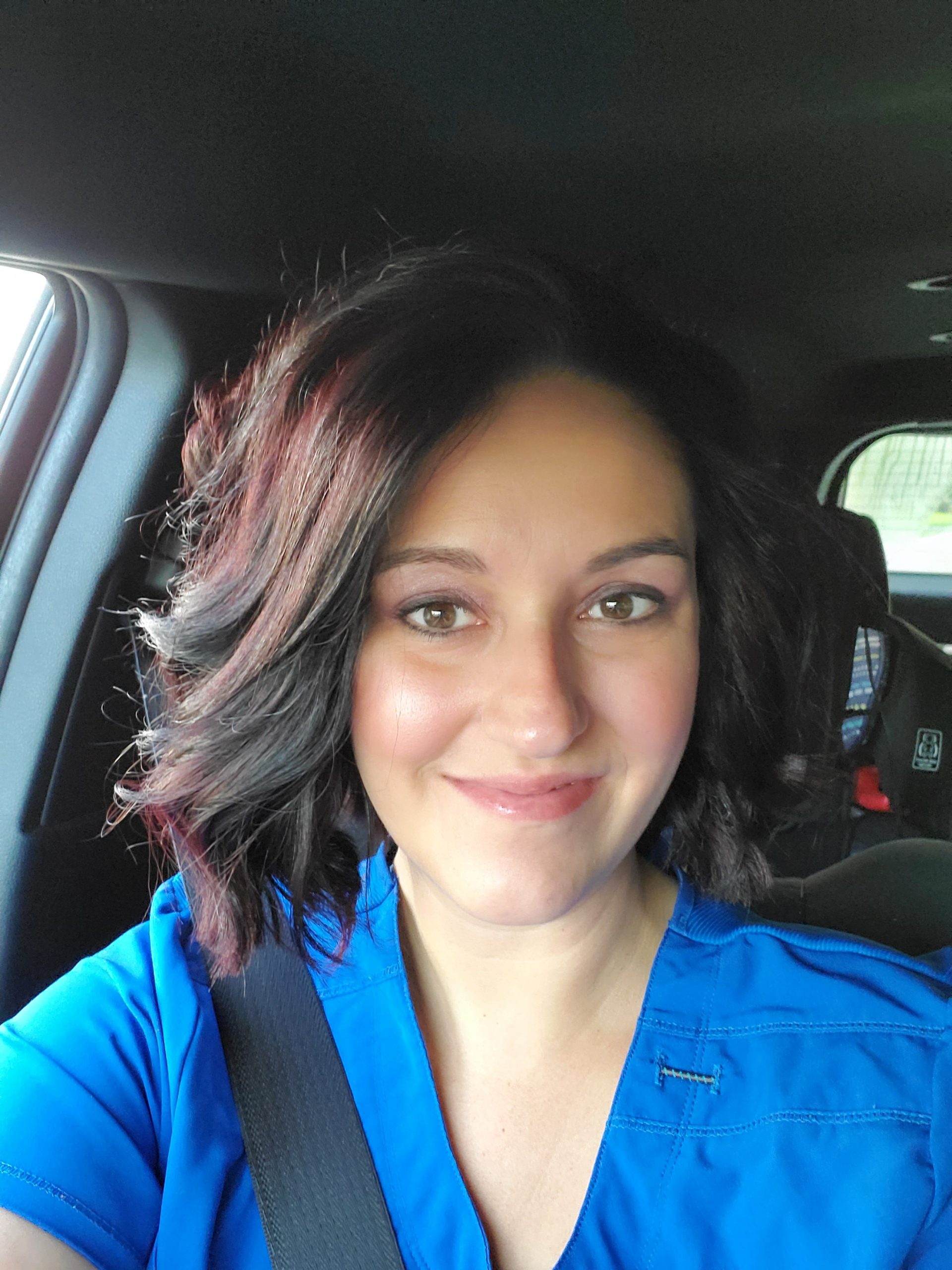 Q. Could you please explain your job — what it is you do daily?
Q. Could you please explain your job — what it is you do daily?
Brittany DeCrease, emergency department nurse manager: I am the nurse manager of Reynolds Memorial Hospital emergency department, stroke program coordinator and trauma program manager. My daily duties include everyday oversight of the emergency department operations; assisting on code blue (cardiac arrest), code stroke (new onset stroke patients) and trauma page patients; and performing bedside care. I spend most of my days hopping from one task to another, but enjoy spending the majority of my time in the department assisting my team. I institute new policy and procedures as needed to better care for our patients. I serve as a resource for my team when they have questions or concerns over situations or patient care. I also teach American Heart Association courses in our facility, and ensure that my department completes their required annual education and competencies.
Q. How has life in the hospital changed since COVID-19? How has your life changed?
Brittany: We have had drastic changes in our department since the onset of COVID-19. We have had several policies change. There are no visitors allowed in the hospital, which has been hard explaining to patient family members when their loved one is having an emergency. We are all more cautious when taking care of patients, ensuring we are wearing appropriate PPE when patients are exhibiting any potential signs or symptoms of COVID-19. We are wearing masks throughout the facility. We have had to get creative with wearing our masks, utilizing buttons sewn to headbands and ribbons to hook the ear straps to in order to relieve the pressure from our ears. It is in our nature to run toward a patient that is in distress, but now we have to take extra steps to ensure we are protecting ourselves prior to entering the room of a potential COVID-19 patient. Our volume actually dropped in our department, from seeing 70-80 patients daily to seeing as low as the 20s daily. This drastic decrease has given staff time to adjust to new policies and protocols that came with COVID-19.
Q. What efforts are being taken to protect the nurses on shift?
Brittany: We have stepped up the frequency of housekeeping cleaning our department. We have created a plan of which rooms to place the potential COVID-19 patients in to isolate and identify these patients, including a separate waiting room for patients with symptoms if a room is not available. We have discussions frequently with staff regarding what appropriate PPE is required and how to best protect themselves. The hospital has staff showers for anyone who wants to shower prior to leaving the facility, and will lauder staff scrubs if desired. I personally will observe staff when I am in the department to ensure that they are best protecting themselves.
Q. Did you ever think you’d see a pandemic like this in your lifetime?
Brittany: Even at the beginning of the outbreak of COVID-19 in China, I downplayed it in my mind. I never thought that in our modern times we would have a pandemic of this proportion. I have been blown away by the impact of this virus.
Q. Why did you become a nurse?
Brittany: Honestly, I never thought this was a career I would go into when I was coming out of high school. I “settled” on nursing when I couldn’t pick a major, because I knew that there would be opportunities no matter where I lived. Upon passing my boards, I started off working a general inpatient unit. After floating one time to the emergency department, I knew I needed to work in that environment the rest of my life. I quickly applied and hired on at Reynolds Memorial Hospital and have been here ever since. I love working in the emergency department. The fast pace, ever changing environment fuels the adrenaline junkie in me. Seeing the impact you can make in a patient’s life, whether from helping stabilize them or just talking to them when they are at their low point, is very gratifying.
Q. Because this is Nurse Appreciation Week, what would you like to say about your team and fellow coworkers?
Brittany: I can honestly say that I have one of the best emergency department teams. From our ancillary staff, nurses, advanced practice providers and physicians, we function as a team and work toward the common goal of excellent patient care. Our department has come a long way from where we were when I first started here. With the closure of OVMC/EORH, we took on a huge increase in patient volume and had to adapt to ensure patients were cared for. The staff has taken every change and expectation I have given them and stepped up to the challenge. I am incredibly proud of my team. The staff here are not just my team or coworkers, they are my family.
Q. If there was one thing you could tell the public or ask the public to do to stay safe, what would it be?
Brittany: Please continue to practice good hand hygiene, wear masks when in public venues and avoid large gatherings. My biggest fear is that when we reopen everything people will stop being cautious, causing the surge that we have been able to avoid thus far.
Brittney Mugrage, Reynolds Memorial Hospital
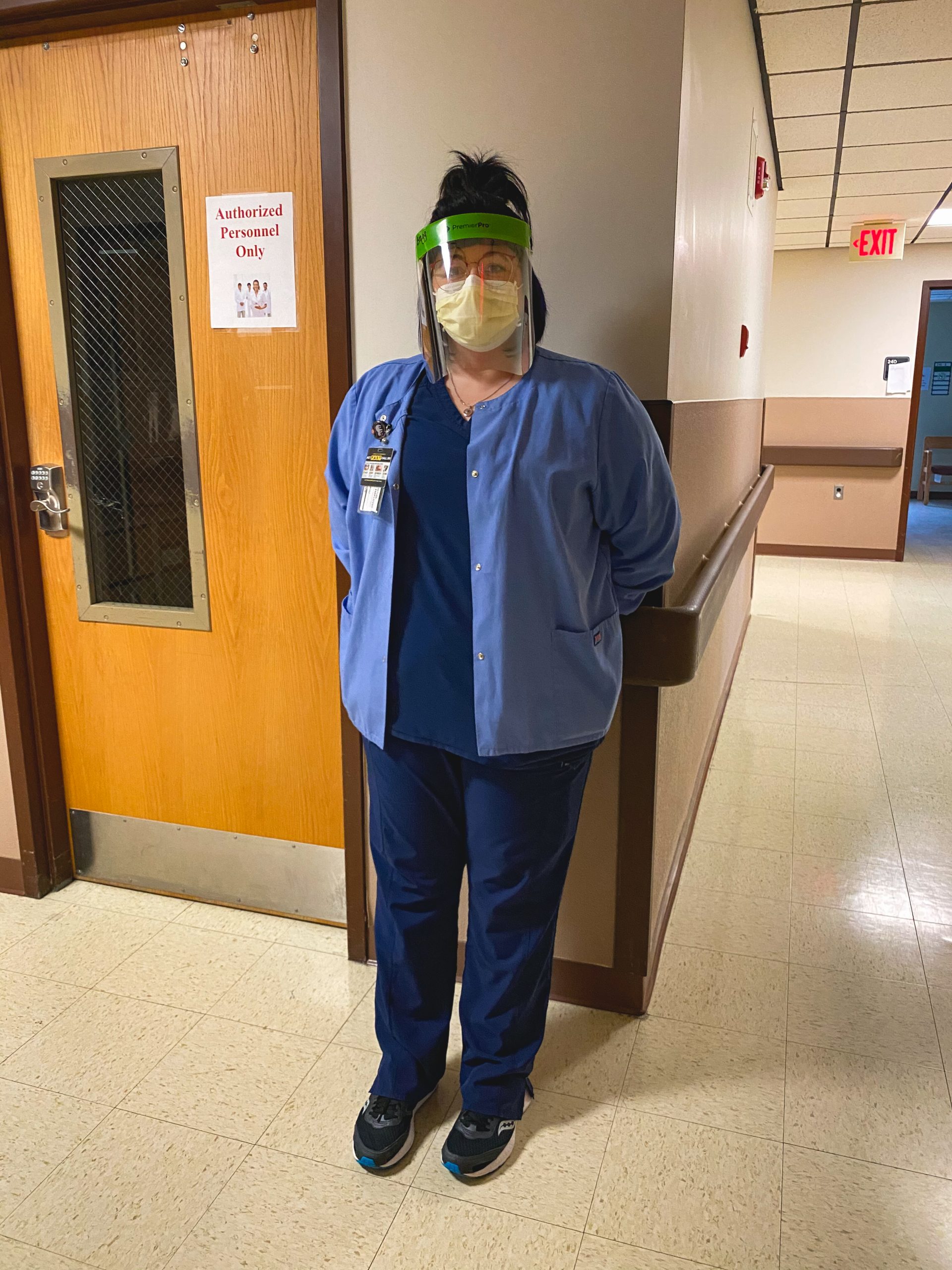 Q. Could you please explain your job — what it is you do daily?
Q. Could you please explain your job — what it is you do daily?
Brittney Mugrage, CNA: I am a certified nurses side; I provide care to patients.
Q. How has life in the hospital changed since COVID-19? How has your life changed?
Brittney: People are being more cautious. My life has changed in the way that I am unable to do much with everything being closed. I am experiencing job uncertainty due to upcoming completion of additional education and not being sure if and when I will be able to practice.
Q. What efforts are being taken to protect the nurses on shift?
Brittney: Additional PPE is being used. Great effort goes into communicating daily changes regarding PPE protection.
Q. Did you ever think you’d see a pandemic like this in your lifetime?
Brittney: I did not think I would ever see a pandemic like this in my lifetime.
Q. Because it is Nurse Appreciation Week, what would you like to say about your team and fellow coworkers?
Brittney: I think we have all come together, adapted and function as a team.
Q. If there was one thing you could tell the public or ask the public to do to stay safe, what would it be?
Brittney: Stay home, wash your hands and wear a mask!
Cynthia Polen, Wheeling Hospital
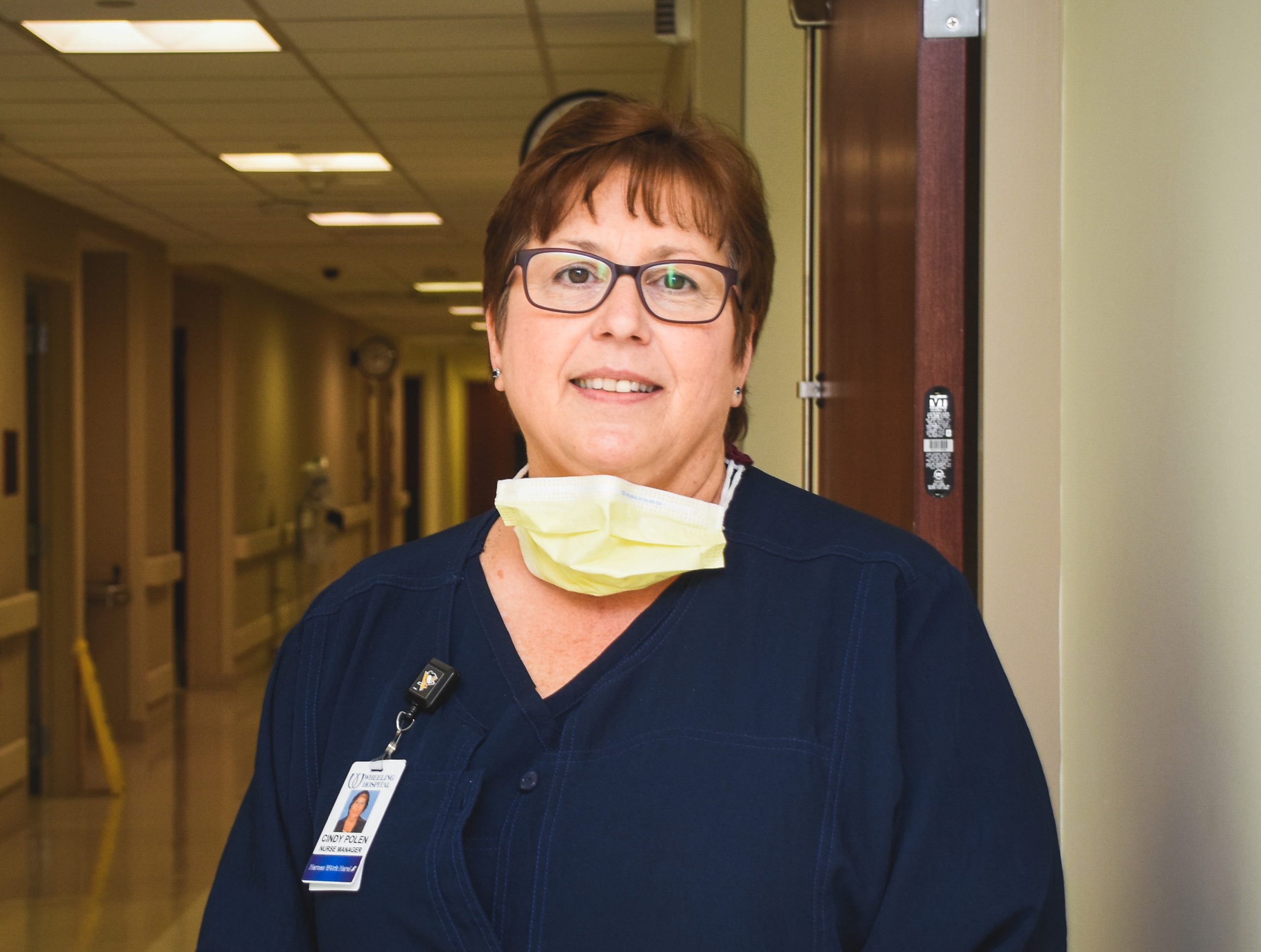
Q. Could you please explain your job — what it is you do daily?
Cynthia: I am the nurse manager for fifth floor, the observation unit, diabetes education and now the pandemic unit. I am responsible for the day-to-day operations of these units and their staff.
Q. How has life in the hospital changed since COVID-19? How has your life changed?
Cynthia: Life has changed tremendously with this pandemic. Not having visitors for our patients is probably the hardest aspect. The families call in frequently for updates, our physicians and staff call them with updates, and we use a tablet so they can video chat with their loved ones. This is a very isolating disease.
Q. What efforts are being taken to protect the nurses on shift?
Cynthia: We opened up two COVID-19 units to segregate these patients from general population and staff. We have been provided adequate amount of PPE and have had a lot of education sessions with staff about proper PPE. A staff education RN rounds every day to see if anyone has any questions about PPE.
Q. Did you ever think you’d see a pandemic like this in your lifetime?
Cynthia: I would have never dreamed this nightmare of a pandemic. I remember the old “Outbreak” movie and always thought it was possible, but you really don’t think you will see something like this in your lifetime. Thankfully, I work with an excellent team, and we have been able to continue to take excellent care of our patients along with protecting our staff.
Q, Because it is Nurse Appreciation Week, what would you like to say about your team and fellow coworkers?
Cynthia: I could go on and on about my staff. When the pandemic first started I can’t tell you how many told me they would volunteer for the pandemic unit. They wanted to protect their friends/coworkers by putting themselves at potential risk. They are a family, and they take care of each other. I’m very proud of them and can’t speak highly enough of them. This work is extremely hard, both physically and emotionally, and they have all done wonderfully. We have staff from other nursing departments also assisting us in the pandemic unit, and they have been outstanding. Everyone from dietary, housekeeping, pharmacy, physical and occupational therapy, etc. have been phenomenal and have taken excellent care of our patients. The slogan this year for Nurse’s Week by the American Nursing Association is “The Year of the Nurse.” They chose this theme prior to the pandemic, but they sure were spot on!
Q. If there was one thing you could tell the public or ask the public to do to stay safe, what would it be?
Cynthia: Please stay at home. If you can’t stay at home, please follow guidelines for social distancing, masks in public and wash your hands! This disease is no joke.
Mike Hughes, Reynolds Memorial
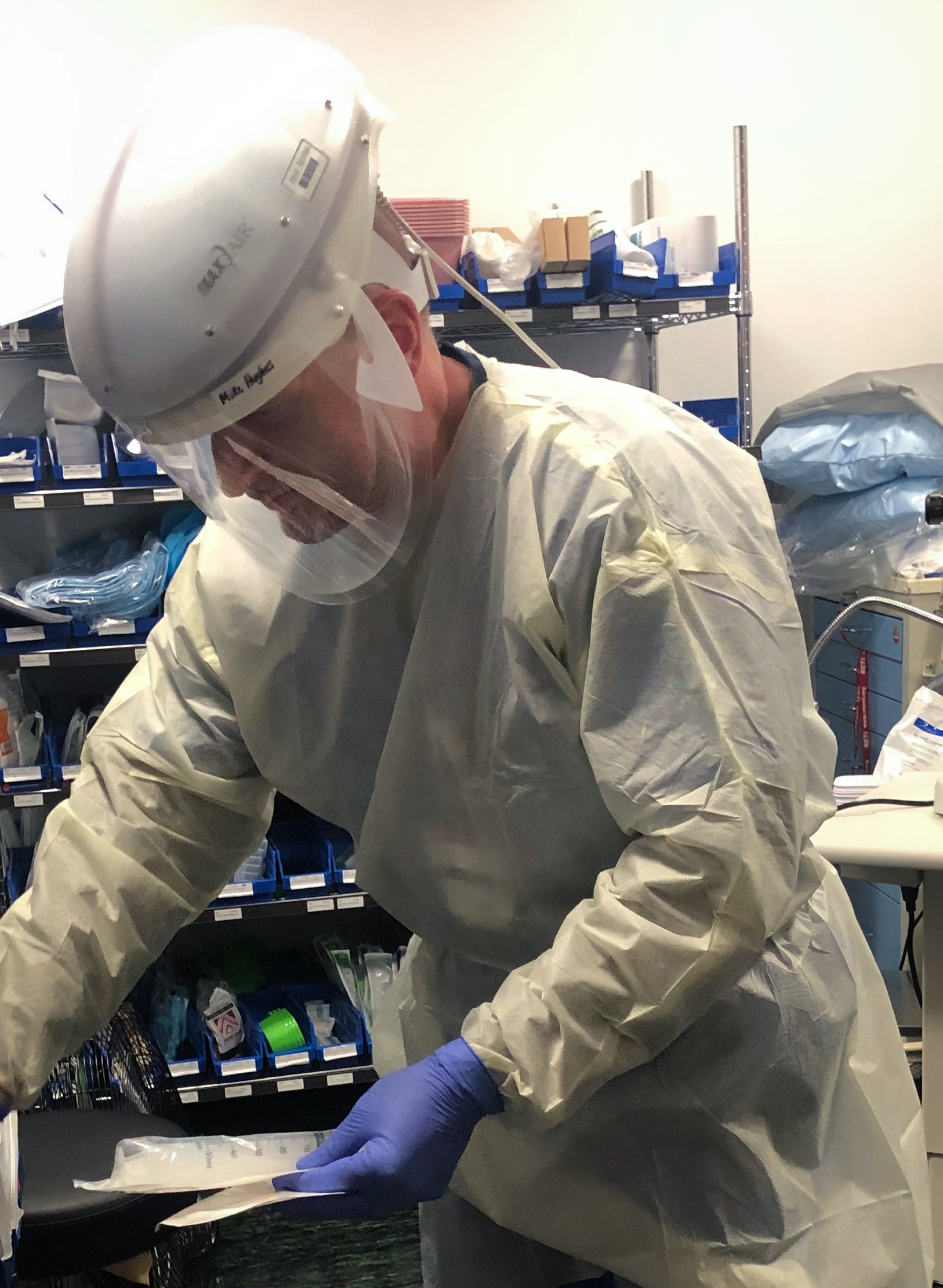 Q. Could you please explain your job what is your daily duty?
Q. Could you please explain your job what is your daily duty?
Michael J. Hughes, MS, BSN, RN, CEN, CFRN, TCRN, CTRN, CPEN, MCCN, NREMT, ATC: I am an emergency department nurse at a 12-bed department that has expanded with an additional six hallway beds for a total of 18 beds. We have four room pods. It is our job to assess the patients after initial triage and to provide treatments and reassessments. We are all certified in ACLS, PALS and TNCC as well as CPR. I am also board-certified emergency nursing. We troubleshoot and provide critical thinking components to our assessments and treatments.
Q. How has life in the hospital changed since COVID-19? How has your life changed?
Mike: Believe it or not, the census in our rural system is down as is the census at other regional hospitals. We have not been affected by that many positive cases. However we do take the necessary precautions personal protective equipment and have a high index of suspicion for COVID-19 suspect patients. I work in multiple different health care arenas in hospital, prehospital and education so my role — other than social distancing and personal protective equipment — has not changed that much with the exception of we were are no longer doing face-to-face classes or training.
Q. What efforts are being taken to protect nurses on shift?
Mike: We obviously wear surgical masks at a minimum with N95 masks and CAPR helmets with gown and gloves for COVID-19 suspected or confirmed patients. We also use our negative isolation rooms. We have a different waiting room, and we are obviously more concerned about touching our faces utilizing appropriate hand hygiene and distancing ourselves from others
Q. Did you ever think you’d see a pandemic like this in your lifetime?
Mike: Absolutely not. It’s amazing how a virus can affect your life in so many ways. I’m hoping the projected numbers are wrong, and we don’t see many more deaths than the annual flu — although those numbers are getting pretty close in terms of those succumbing to the disease.
Q. Why did you go into the nursing profession?
Mike: Believe it or not, I never wanted to be a nurse I applied to physician assistant school and, after the first year of not getting in, I thought I’d go to nursing school to eventually get my nurse practitioner. After working in the emergency department for three years, I realized that’s where I wanted to stay. I also became a flight nurse, which has been extremely rewarding.
Q. Because this is Nurse Appreciation Week, what would you like to say about your team and fellow coworkers?
Mike: Keep up the great work, hang in there. Things will hopefully get back to normal soon. For that I am very hopeful
Q. If there is one thing that you could tell the public or ask the public to do to say, what would it be?
Mike: Take it seriously even if you think it’s over-blown!!! Better to stay safe than to be sorry.
Kelsey Nicholes, Wheeling Hospital
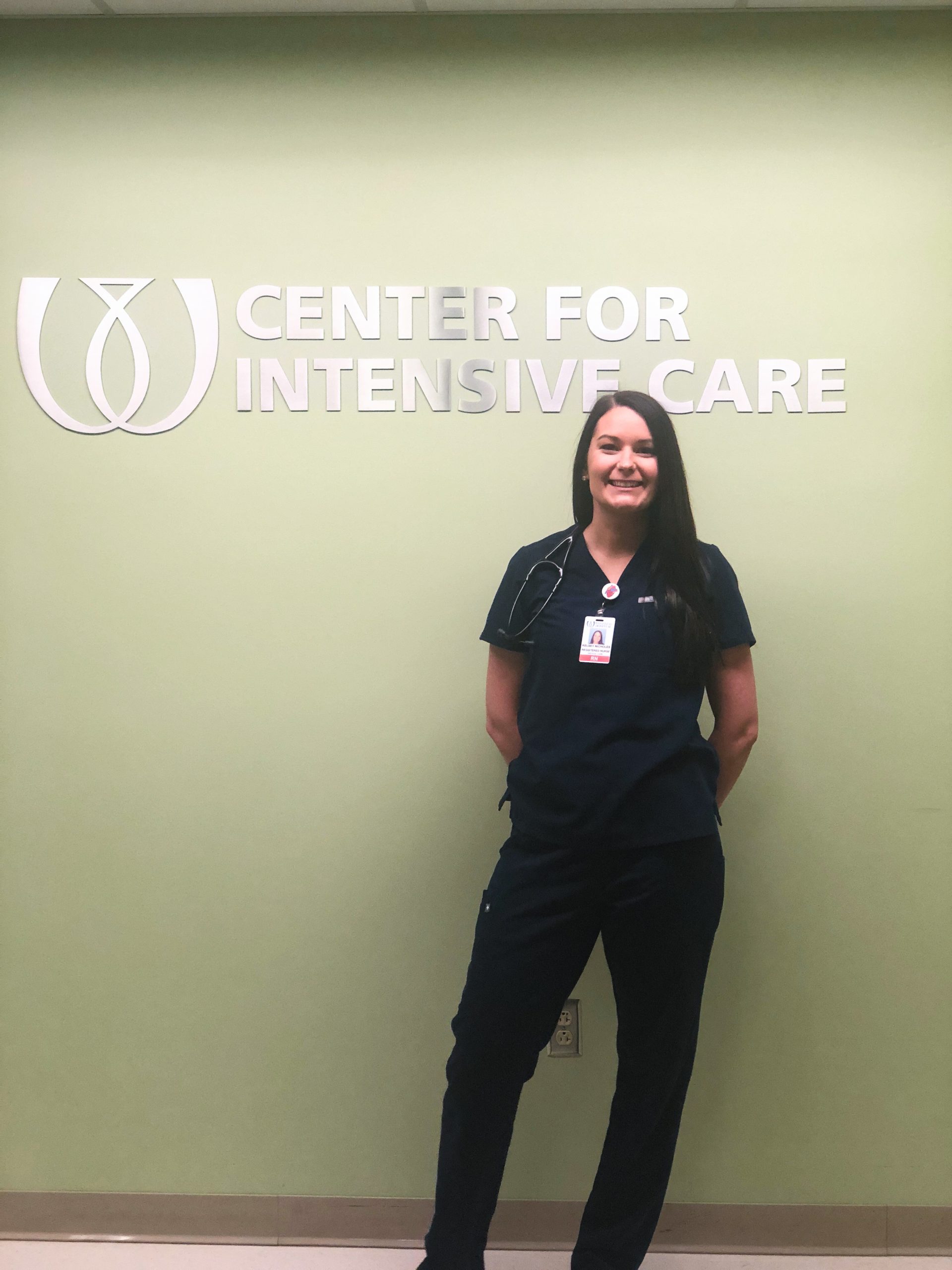 Q. Could you please explain your job — what it is you do daily?
Q. Could you please explain your job — what it is you do daily?
Kelsey Nicholes, RN: I am a registered nurse in an intensive care unit [at Wheeling Hospital]. We are a mixed ICU of medical, surgical and cardiac patients. We see many different types of patients and our acuity is growing. We constantly have new devices, procedures and methods to learn to provide our patients the best care. I have been working as a nurse for six years, and there is never a day I don’t learn something new. I provide hands-on care to critical patients in what is often the worst time of their lives.
Q. How has life in the hospital changed since COVID-19? How has your life changed?
Kelsey: I am much more aware of my surroundings in the hospital; what I touch, what I’m wearing and who I come in contact with. I also am much more aware of hospital supplies, such as personal protective equipment. What used to seem like a never-ending supply is now counted and signed out by name. Prior to the pandemic, if your facemask band broke, you got a new one without thinking. Now if that happens, you have to have a replacement signed out with a nursing supervisor.
You leave at the end of the long day taking more thoughts home with you than ever. I ask myself questions like: Did we do enough? Will these patients survive this? How long will it be before I am caring for a loved one with COVID-19? Will I take this home to my loved ones and family? What happens if I get sick? Will the hospital ever go back to how it was before COVID-19? My life has changed because I don’t get the choice of staying home or limiting my exposure. I show up every day to care for patients, whether positive COVID-19 or not, and put my health at risk.
Q. What made you want to be a nurse?
Kelsey: The nursing field has so many opportunities. You aren’t restricted to a certain type of setting or pace. You can start your career in a fast-paced environment that is very hands-on and later progress to a setting that is more behind the scenes. Every nurse and medical professional that comes in contact with a patient is important to their plan of care. It takes a village of people to care for patients.
I personally chose nursing because my grandmother said it was an honorable career. I luckily fell in love with this profession and the patients I care for. The fast-paced environment that requires critical thinking brings adrenaline and satisfaction, but truly being relied on by vulnerable patients and families in their time of uncertainty and need and making a difference is what makes being a nurse worth it.
Q. Given the current COVID-19 pandemic, how has this situation reaffirmed your commitment to serving patients?
Kelsey: This pandemic is not for the faint at heart. Every day, showing up to work poses a new challenge that I haven’t experienced. We are working in negative pressure isolation rooms with protective equipment from our heads to our feet. These patients are very critical so we are often in these rooms for hours at a time, with multiple drips and life-support devices. I have seen illness and sadness with the pandemic, but patients and family have been very grateful for care. I have been thanked by patients, family members over the phone and members of the community more in the past few weeks than my entire nursing career. Health care professionals, especially nurses, are getting recognized for our hard work and dedication more than ever. I am thankful we are not seeing an overwhelming number of COVID-19 cases and that patients are continuing to heal and recover. It helps knowing I am making a small difference during the pandemic.
Q. How important has teamwork been throughout this crisis? Would you like to share an example of how teamwork among your fellow nurses/care team has helped lead to a successful outcome.
Kelsey: I have always known that I work with a great staff, but this crisis has solidified my thoughts. I have seen my fellow nurses throw themselves into this pandemic without a second thought. We rely on each other for physical help and critical thinking, as well as emotional support. We sometimes need pep talks to get through our shifts.
I would love to say that every patient has a successful outcome, but that isn’t the case. The best we can do is be there for our patients and provide all the care possible. It is more difficult than normal because family members aren’t always permitted to be here for safety reasons during the pandemic. That means patients are without family and friends while fighting this virus. During this crisis, our nursing staff has shown beyond compassionate care with a patient at the end of their life. Family may not have been able to be with their loved one in their last moments, but I hope they take a small bit of comfort knowing our nurses never left their side. Facetiming family and holding their hand is sometimes all we can do. I am proud to work with such a caring team.
Crystal Bragg, Reynolds Memorial Hospital
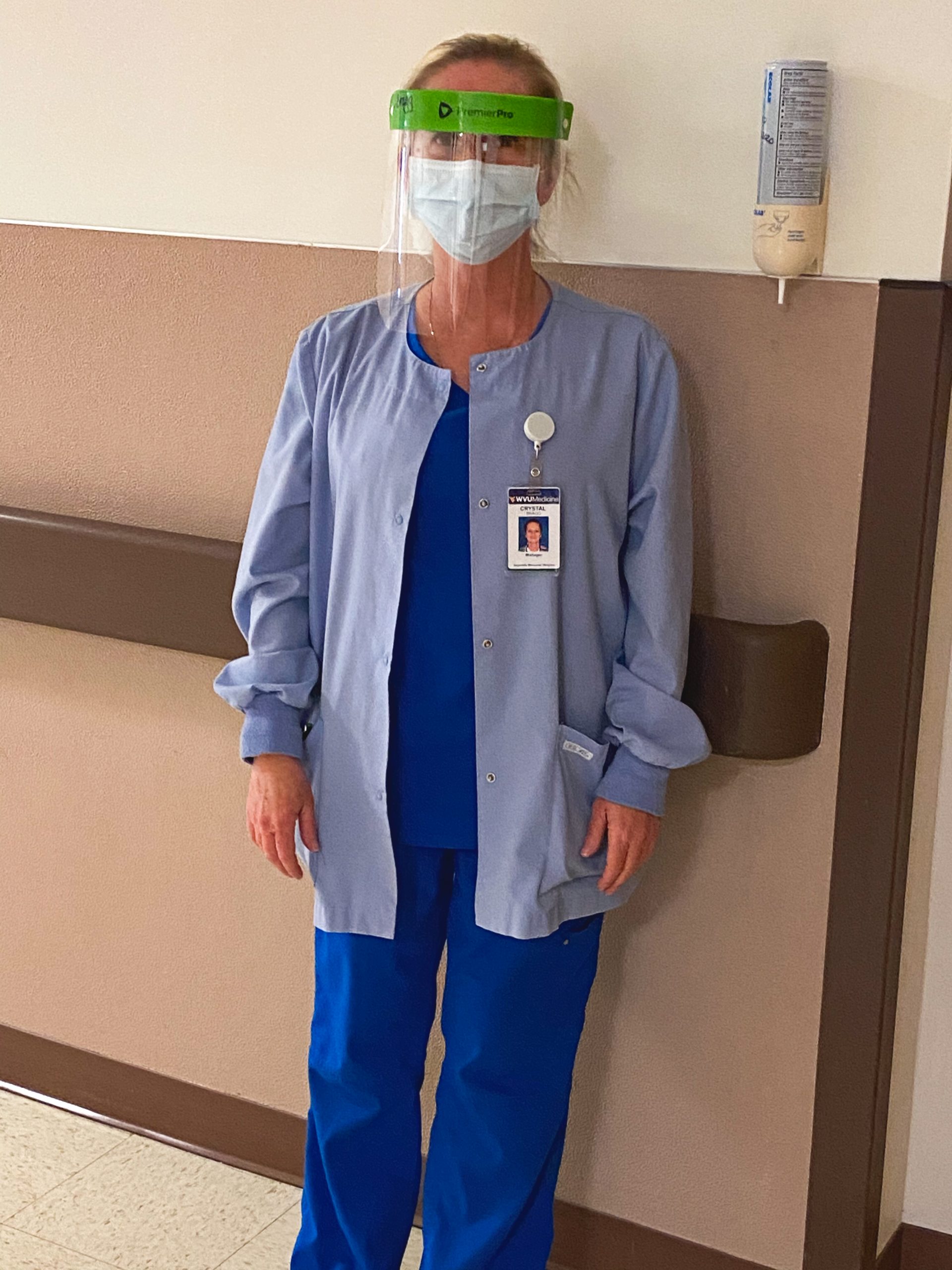 Q. Could you please explain your job — what it is you do daily?
Q. Could you please explain your job — what it is you do daily?
Crystal Bragg, BSN-RN: I am a nurse manager on a medical-surgical unit. I provide care to patients as well as oversee the daily activities of the department.
Q. How has life in the hospital changed since COVID-19? How has your life changed?
Crystal: Life has changed in numerous ways in the hospital due to COVID-19. The no-visitor policy greatly affects the department. Patients and family members have increased anxiety. Every attempt is made to communicate with families via phone. Loved ones are encouraged to call the patient or the nurses station to request updates.
Q. What efforts are being taken to protect the nurses on shift?
Crystal: The efforts being taken to protect the nurses on shift include cleaning of the nurses’ stations/computers/phones every few hours. PPE is provided and monitored every shift. Also important to provide to the team is positive mental support.
Q. Did you ever think you’d see a pandemic like this in your lifetime?
Crystal: I never thought I would see a pandemic like this in my lifetime.
Q. Because it is Nurse Appreciation Week, what would you like to say about your team and fellow coworkers?
Crystal: My team, fellow coworkers and I pursued a profession in nursing to care for people in their time of need. While no one thought we would provide care during a pandemic, this is nursing. I could not be more grateful to be part of such an amazing team of nurses as 2N.
Q. If there was one thing you could tell the public or ask the public to do to stay safe, what would it be?
Crystal: If I could ask the public one thing to do to stay safe, that would be follow the recommendations of local and state authorities.
Stephanie Islay, Wheeling Hospital
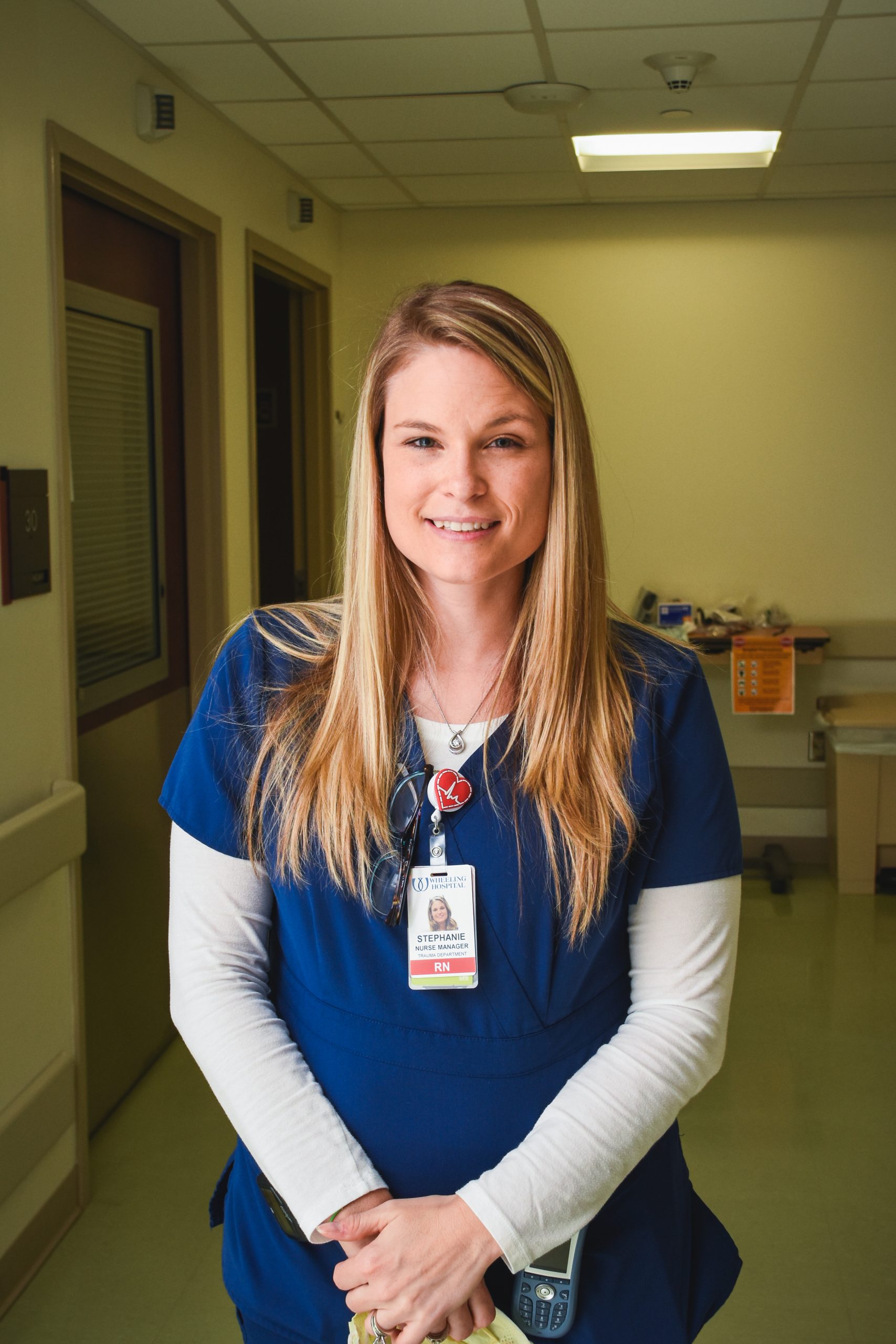 Q. Could you please explain your job — what it is you do daily?
Q. Could you please explain your job — what it is you do daily?
Stephanie Isaly, trauma program manager: I’m Wheeling Hospital’s trauma program manager. I work in collaboration with our trauma medical director to oversee the trauma program, ensuring all state and national standards are met in maintaining our Level II Trauma Center designation. I round on trauma patients and perform concurrent and retrospective reviews to ensure high standards of care are met.
Q. How has life in the hospital changed since COVID-19? How has your life changed?
Stephanie: Personally, my job has changed since my trauma registrars are working from home, and I’m still working out of the hospital. Daily duties have been altered to accommodate the change in workflow. All meetings are now by web or teleconference. Plans for major events I have been planning months for have been canceled. Everything seems to be at a standstill while we work through this “new normal.” One big change is the ability to convey my feelings by facial expression, as everyone is wearing masks. As I was walking through the halls of the ER one day last week, I smiled at a couple nurses working that day — only to realize they can’t tell that I’m smiling at them. Same thing applies to my patients when I go in to round on them — makes you realize how important body language and facial expressions are in getting our feelings across or providing comfort to our patients in their time of need.
Q. What efforts are being taken to protect nurses in the hospital?
Stephanie: I feel like Wheeling Hospital’s administration and infection control department along with nursing education have done an amazing job keeping everyone informed on what PPE (personal protective equipment) is needed depending on where you are working as well as making sure all employees are educated on how to use it. Our CEO has been sending out a daily newsletter to all employees, keeping them up-to-date on PPE and testing.
Q. Did you ever think you’d see a pandemic like this in your lifetime?
Stephanie: Absolutely not.
Q. What would you want to the public to know about your nurses for Nurse Appreciation Week? Are you proud of your nurses?
Stephanie: INCREDIBLE. The nurses I work with are beyond amazing. With all the new barriers we have faced in the last month, they continue to show up for work with a smile on their face, ready to take on the day, selflessly caring for others during the most vulnerable times in their lives. They go home, and come in and do it all over again. I have an enormous amount of respect for all of them!
Q. What would you urge the public to do in these times to stay healthy?
Stephanie: I think I can best answer this question by giving an example. I went to the store the other day. Many people had masks. Many did not. One person in particular was shopping with a mask and gloves. I watched her lean over to get something off the shelf and then reach up to push her glasses back up on her face. What good are the gloves doing if you’re touching your face with them, right? Frequent hand washing is a must. Masks help protect not only the person wearing them, but those around you.
Writer’s note: Thanks to Alex Panas, marketing specialist at Wheeling Hospital, who assisted with this Q&A.


